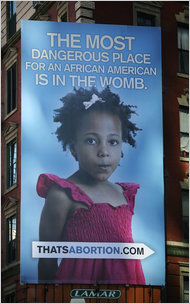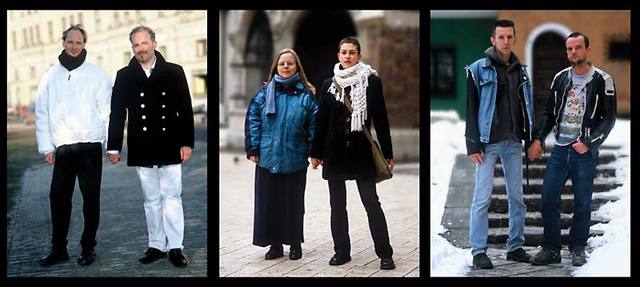 The latest billboard controversy, around the removal of a billboard paid for by a Texas anti-abortion group from an advertising space in SoHo
The latest billboard controversy, around the removal of a billboard paid for by a Texas anti-abortion group from an advertising space in SoHo , owned by Lamar Advertising, comes as no surprise. In 2006 Lamar refused to run photographs by Polish artist Karolina Bregula that show same-sex couples holding hands. The photographs were to be displayed as part of a Real Art Ways’ show of contemporary polish art. At least Lamar has no ideological bias – they just censor anything that is controversial…
, owned by Lamar Advertising, comes as no surprise. In 2006 Lamar refused to run photographs by Polish artist Karolina Bregula that show same-sex couples holding hands. The photographs were to be displayed as part of a Real Art Ways’ show of contemporary polish art. At least Lamar has no ideological bias – they just censor anything that is controversial…
Lamar owns 151,000 billboards around the United States. An even larger giant, Clear Channel Communications, owns over 200,000 advertising display faces (in their own words) in the U.S. and over 700,000 displays in over 45 countries across 5 continents. Clear Channel Spectacolor is 
But that is not where it ends, in 2008, the third giant of billboard advertising, CBS Outdoor, canceled a contract to display a public art project on five billboards in Minneapolis and St. Paul during the RNC. The billboards, part of her “Soldiers Billboard  Project,” would have shown soldiers facing the viewer, with their heads positioned on a table, as if at rest. The pose suggests vulnerability, a trait in direct opposition to public perceptions of those in the armed forces. CBS Outdoor were concerned that some might misinterpret the billboards’ message and see them as disrespectful.
Project,” would have shown soldiers facing the viewer, with their heads positioned on a table, as if at rest. The pose suggests vulnerability, a trait in direct opposition to public perceptions of those in the armed forces. CBS Outdoor were concerned that some might misinterpret the billboards’ message and see them as disrespectful.
The examples go on and on. These three large companies plus a handful of others others own the bulk of public displays in the U.S., not only billboards, but digital displays, street furniture, space on vehicles, etc. We are barraged by advertising as we drive and as we walk and the content of that advertising is controlled by a few large corporations.
The private ownership of public space in the shape of billboards makes us hostage to a company’s ideological prejudices or its fear of alienating a particular constituency. Selling phones or cars is usually just as lucrative as selling space to those who want to promote their ideas, and less controversial: so why not just sell products? Why not, indeed?Private companies have the constitutional right to censor to their heart’s content, they can decide to just sell cars rather than give space to public conversations about war.
Yet there is something wrong with this picture: we are herded along freeways asked to buy and buy and rarely to think, we walk through city streets in a cacophony of the same messages, increasingly alienated because what we really care about is absent from our visual environment, increasingly unhappy as we realize we will never be that blissful couple on its dream Caribbean beach… It is time to re-think the meaning of public space and what we are giving up when we are surrendering it to the control of corporations impervious to First Amendment imperatives and indifferent to anything but the bottom line.

